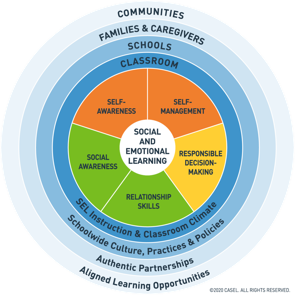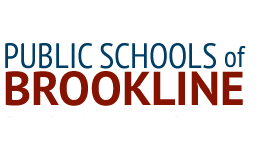Social Emotional Learning (SEL)
-
Social Emotional Learning (SEL) is the “process through which all young people and adults acquire and apply the knowledge, skills, and attitudes to develop healthy identities, manage emotions, achieve personal and collective goals, feel and show empathy for others, establish and maintain supportive relationships, and make responsible and caring decisions.” (CASEL).

The increased attention that schools have placed on SEL in recent years is the result of the accumulating evidence that a child’s academic performance is deeply related to their social-emotional competence and wellness. For example, strong social-emotional skills are related to:- Higher levels of academic performance (e.g., grades)
- Higher levels of educational attainment (e.g., enrollment in post-secondary institutions),
- Increased attendance, and
- Higher levels of academic engagement (e.g., on-task behavior)
Given these findings, SEL skills can be thought of as “academic-enablers,” or skills that allow students to more consistently and effectively engage, participate, and benefit from classroom instruction.
Beyond academic functioning, students with strong social-emotional skills also report stronger and more healthy interpersonal relationships, higher levels of subjective well-being, fewer mental health symptoms (e.g., anxiety and depression), and reduced engagement in risk-taking behavior (e.g., substance use).
From a community perspective, evidence from Columbia University’s Center for Cost-Benefit Analysis found that for every $1 spent on SEL programming, the return on investment is $11 in long-term benefits to students, schools, and communities.
There are five core competencies described by the Collaborative for Academic, Social, and Emotional Learning (CASEL) that aid in providing students with the necessary strategies to build resilience towards the social demands of an ever-changing world:
- Self-awareness: The ability to accurately recognize one’s emotions and thoughts and their influence on behavior. This includes accurately assessing one’s strengths and limitations and possessing a well-grounded sense of confidence and optimism.
- Self-management: The ability to regulate one’s emotions, thoughts, and behaviors effectively in different situations. This includes managing stress, controlling impulses, motivating oneself, and setting and working toward achieving personal and academic goals.
- Social awareness: The ability to take the perspective of and empathize with others from diverse backgrounds and cultures, to understand social and ethical norms for behavior, and to recognize family, school, and community resources and supports.
- Relationship skills: The ability to establish and maintain healthy and rewarding relationships with diverse individuals and groups. This includes communicating clearly, listening actively, cooperating, resisting inappropriate social pressure, negotiating conflict constructively, and seeking and offering help when needed.
- Responsible decision-making: The ability to make constructive and respectful choices about personal behavior and social interactions based on consideration of ethical standards, safety concerns, social norms, the realistic evaluation of consequences of various actions, and the well-being of self and others
Social Emotional Learning in PSB
-
In the Public Schools of Brookline, our educators use a variety of practices to support the wellness and social-emotional development of students. For example, educators often target SEL by embedding it into teaching routines (e.g., beginning the day with a community-building activity), infusing it into academic curricula (e.g., reflecting on the emotional experiences of a character), or by teaching it explicitly (e.g., teaching students how to manage stress).
The primary goals of our Social-Emotional program are to:
- Strengthen students’ social-emotional skills in the areas of self-awareness, self-management, social awareness, relationship building, and responsible decision-making.
- Create safe, supportive, and affirming classroom and school communities, which include strong peer and adult relationships.
- Ensure and facilitate access to high-quality, culturally-affirming mental health care (at school and within the community).
By investing time and resources in SEL, we will help ensure that all of our students are emotionally and psychologically prepared to engage in learning. In this context, our commitment to SEL will allow our students to more meaningfully pursue all of their personal, social, academic, and vocational goals.


